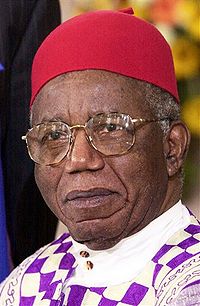Chinua Achebe (writer): Difference between revisions
m (1 revision) |
No edit summary |
||
| (15 intermediate revisions by 2 users not shown) | |||
| Line 1: | Line 1: | ||
====Date: [[:Category: | ====Date: [[:Category:1958|1958]]- Present ==== | ||
====Region: [[:Category:Africa|Africa]]==== | |||
====Subject: [[:Category:Political/Economic/Social Opinion|Political/Economic/Social Opinion]]==== | |||
==== | ====Medium: [[:Category:Literature|Literature]]==== | ||
---- | |||
[[File:chinua_achebe2.jpg|right|200px]] | |||
'''Artist:''' Chinua Achebe | '''Artist:''' Chinua Achebe | ||
'''Confronting Bodies:''' Nigerian government | '''Confronting Bodies:''' Nigerian government | ||
'''Dates of Action:''' 1988 | '''Dates of Action:''' 1988 | ||
'''Location:''' Nigeria | '''Location:''' Nigeria | ||
'''Description of Artwork:''' Achebe has been expressing his criticisms of the Nigerian government through radio and literary commentary throughout his life. His most notable experience with censorship came in 1988 when he suggested that a veteran politician, Obafeni Awolowo, was not a great national leader and did not deserve a state funeral. <P> | '''Description of Artwork:''' Achebe has been expressing his criticisms of the Nigerian government through radio and literary commentary throughout his life. His most notable experience with censorship came in 1988 when he suggested that a veteran politician, Obafeni Awolowo, was not a great national leader and did not deserve a state funeral. <P> | ||
'''The Incident:''' Achebe has been threatened throughout his career as a journalist and creative writer. Nigeria's attorney general and minister of information threatened Achebe while he was controller of the Nigerian Broadcasting Corporation of the eastern region of Nigeria. The government officials accused him of biased reporting during the country's first elections free of British rule. Achebe also worked with the eastern Nigerian seccessionists, the Biafran Organisation of Freedom Fighters. Achebe has completed numerous literary works. His first, ''Things Fall Apart'' (1958), describes the harmful effects of colonialism on Nigeria's culture. ''A Man of the People'' (1966) was his first major literary work that described the corruption rife within the Nigerian government. All of his works, both fictional and non-fictional, address corruption and social issues in Nigeria and other African dictatorships. While Achebe received numerous threats, his work was not censored until 1988. <P> | |||
'''The Incident:''' Achebe has been threatened throughout his career as a journalist and creative writer. Nigeria's attorney general and minister of information threatened Achebe while he was controller of the Nigerian Broadcasting Corporation of the eastern region of Nigeria. The government officials accused him of biased reporting during the country's first elections free of British rule. Achebe also worked with the eastern Nigerian seccessionists, the Biafran Organisation of Freedom Fighters. Achebe has completed numerous literary works. His first, | |||
'''Results of Incident:''' In 1988, after Achebe made the critical comments about Obafeni Awolowo, the western Nigerian states banned his work. <P> | '''Results of Incident:''' In 1988, after Achebe made the critical comments about Obafeni Awolowo, the western Nigerian states banned his work. <P> | ||
'''Source:''' Censorship, A World Encyclopedia, ed. D. Jones | '''Source:''' Censorship, A World Encyclopedia, ed. D. Jones | ||
| Line 47: | Line 32: | ||
[[Category: | [[Category:1988]] | ||
[[Category:]] | [[Category:1980s]] | ||
[[Category:]] | [[Category:20th century]] | ||
[[Category:Africa]] | [[Category:Africa]] | ||
[[Category: | [[Category:Nigeria]] | ||
[[Category:Political/Economic/Social Opinion]] | [[Category:Political/Economic/Social Opinion]] | ||
[[Category:Literature]] | [[Category:Literature]] | ||
{{DEFAULTSORT:Achebe, Chinua}} | |||
__NOTOC__ | __NOTOC__ | ||
Latest revision as of 21:27, 15 November 2016
Date: 1958- Present
Region: Africa
Subject: Political/Economic/Social Opinion
Medium: Literature
Artist: Chinua Achebe
Confronting Bodies: Nigerian government
Dates of Action: 1988
Location: Nigeria
Description of Artwork: Achebe has been expressing his criticisms of the Nigerian government through radio and literary commentary throughout his life. His most notable experience with censorship came in 1988 when he suggested that a veteran politician, Obafeni Awolowo, was not a great national leader and did not deserve a state funeral.
The Incident: Achebe has been threatened throughout his career as a journalist and creative writer. Nigeria's attorney general and minister of information threatened Achebe while he was controller of the Nigerian Broadcasting Corporation of the eastern region of Nigeria. The government officials accused him of biased reporting during the country's first elections free of British rule. Achebe also worked with the eastern Nigerian seccessionists, the Biafran Organisation of Freedom Fighters. Achebe has completed numerous literary works. His first, Things Fall Apart (1958), describes the harmful effects of colonialism on Nigeria's culture. A Man of the People (1966) was his first major literary work that described the corruption rife within the Nigerian government. All of his works, both fictional and non-fictional, address corruption and social issues in Nigeria and other African dictatorships. While Achebe received numerous threats, his work was not censored until 1988.
Results of Incident: In 1988, after Achebe made the critical comments about Obafeni Awolowo, the western Nigerian states banned his work.
Source: Censorship, A World Encyclopedia, ed. D. Jones
